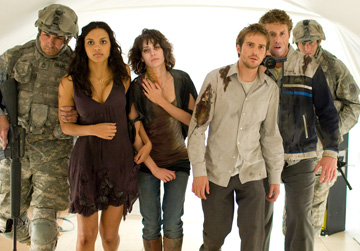 A jittery pastiche of more movies than I care to list, J.J. Abrams’s Cloverfield is thankfully as entertaining as it is shameless. It may be a case study in "stealing from the best", but Abrams and his co-conspirators (director Matt Reeves and screenwriter Drew Goddard) are so brazen with their smash-and-grab aesthetic that you almost admire their utter lack of originality. At its best, it’s a giddy mash note to the giant monster movies we used to watch on the Saturday afternoon creature feature; and there are moments of awe in Cloverfield that evoke a childlike wonder. Abrams, Reeves and Goddard clearly possess the skill to make the most harrowing Godzilla movie of all time. For some reason, they chose to make Destroy All Hipsters instead.
A jittery pastiche of more movies than I care to list, J.J. Abrams’s Cloverfield is thankfully as entertaining as it is shameless. It may be a case study in "stealing from the best", but Abrams and his co-conspirators (director Matt Reeves and screenwriter Drew Goddard) are so brazen with their smash-and-grab aesthetic that you almost admire their utter lack of originality. At its best, it’s a giddy mash note to the giant monster movies we used to watch on the Saturday afternoon creature feature; and there are moments of awe in Cloverfield that evoke a childlike wonder. Abrams, Reeves and Goddard clearly possess the skill to make the most harrowing Godzilla movie of all time. For some reason, they chose to make Destroy All Hipsters instead.
If you’ve ever spent any time around hipsters, it shouldn’t be surprising to learn that there’s endless entertainment value in watching them get smashed and chomped by a large beast of unknown origin. Indeed, if Abrams had the conceptual wherewithal to frame Cloverfield as satire, it might’ve been more than the sum of its set pieces. That’s why I don’t get Abrams’s decision to strand the audience with a group of highly unlikable twentysomethings; surely, he’s aware that these kids are narcissistic at best, imbecilic at worst. I mean, they go out of their way to classify the protagonist, Rob (Michael Stahl-David), as a "douchebag", and then proceed to dramatize him as such. Is his quest to save his true love, Beth (Odette Yustman), while the city descends into chaos noble? As an example of what William Goldman calls "stupid courage", I suppose. But what happens when the rest of the dramatis personae are just plain stupid?
This is a particular challenge in the early going, which is where the filmmakers make the curious decision to involve us in the personal lives of these self-involved ciphers. The story, told through a recording recovered from Central Park (it’s now the property of the U.S. military), begins with Rob documenting the morning after he’s… complicated his friendship with Beth. In her parents’ Columbus Circle apartment. The only thing worse than hipsters? Rich hipsters.
These vignettes, which entail a romantic jaunt out to Coney Island, serve as the largely recorded-over framing device for the rest of the film (someone who’s familiar with this camera informed me that this is technically plausible). Again, I wish there were some kind of satiric intent here, but Abrams seems to think there’s something profound being shared by these characters; right before the monster fires off its first salvo, Rob’s brother, Jason (Mike Vogel), declares that we should "forget about the world and hang on to those people you love the most". This isn’t the selfish worldview I want to hear being espoused by the man charged with reviving Star Trek (whatever happened to "The needs of the many outweigh the needs of the few", J.J.?).
This vacuousness is compounded by the jackass wielding the camera, Rob’s mentally challenged buddy Hud (T.J. Miller). Though this gives Abrams a convenient explanation for the recording of the whole ordeal (only a moron would keep the camera rolling as he’s outrunning a rampaging monster), it also forces us, via subjective camera, to identify with the dumbest character in the movie. This is something Brian De Palma’s Redacted does brilliantly; questioning perspective is the filmic equivalent of an unreliable narrator. But Abrams only views Hud as a useful narrative device and, in the closing minutes, a punch line. It’s not enough to compensate for the time spent listening to his humorless interjections. If there’s a sympathetic character in this sorry lot, it’s Marlena, an antisocial lush played by the undervalued Lizzy Caplan (Janis from Mean Girls). She wins our favor early by fending off Hud’s clumsy advances (another missed opportunity for satire).
Thank god these are but minor distractions once the monster starts knocking down skyscrapers. The only reason we stick with the characters is due to the situation being presented with an immediacy that recalls the havoc of 9/11. What was a novelty in Independence Day is now a given; New York City got hit once, and it is very likely it will get hit again. The allegory is appropriate. If only it were better thought out.
Cloverfield may fall apart upon deconstruction, but it works on a visceral level. And the monster, when viewed in full, isn’t a crushing disappointment. If only it crushed more hipsters.